Autism Evaluation in Henderson, NV
Welcome to our comprehensive guide to autism assessment. At Insights Behavioral Health & Wellness, we understand the importance of early detection and accurate assessment when it comes to autism spectrum disorder (ASD). Our team of experts is dedicated to providing detailed insights and resources to help individuals and families navigate the assessment process with confidence.
Understanding Autism Spectrum Disorder (ASD)
Autism spectrum disorder is a complex neurodevelopmental condition that affects communication, behavior, and social interaction. It presents differently in each individual, ranging from mild to severe symptoms. Early identification and intervention are crucial for improving outcomes and quality of life for individuals with ASD.
Importance of Assessment
Accurate assessment is the cornerstone of effective intervention and support for individuals with ASD. It involves comprehensive evaluation of a range of factors including developmental history, behavior, communication skills, and social interaction. A thorough assessment enables clinicians to make an accurate diagnosis and develop tailored intervention plans to meet the unique needs of each individual.
Types of Assessments
Diagnostic Assessment
A diagnostic assessment is conducted by qualified professionals, such as psychologists, psychiatrists, or developmental pediatricians. It involves gathering information from various sources, including interviews, observations, and standardized tests, to determine whether an individual meets the criteria for ASD.
Developmental Assessment
Developmental assessment focuses on evaluating a child’s developmental milestones and abilities across different domains, such as language, motor skills, and social development. It helps identify areas of strength and areas that may require further support or intervention.
Behavioral Assessment
Behavioral assessment involves observing and analyzing an individual’s behavior in various settings to understand patterns, triggers, and challenges. It helps clinicians develop strategies for managing challenging behaviors and promoting positive social interactions.
The Assessment Process
Initial Screening
The assessment process typically begins with an initial screening to identify potential red flags or concerns related to ASD. Screening tools such as the Modified Checklist for Autism in Toddlers (M-CHAT) or the Autism Diagnostic Observation Schedule (ADOS) may be used to gather preliminary information.
Comprehensive Evaluation
If concerns are raised during the screening process, a comprehensive evaluation is recommended. This may involve a series of assessments conducted by a multidisciplinary team, including psychologists, speech-language pathologists, occupational therapists, and other professionals with expertise in ASD.
Parent and Caregiver Involvement
Parents and caregivers play a vital role in the assessment process by providing valuable insights into their child’s behavior, development, and family history. Their input is essential for developing a holistic understanding of the individual’s strengths, challenges, and support needs.
Collaboration and Communication
Effective collaboration and communication among professionals involved in the assessment process are essential for ensuring comprehensive evaluation and coordinated care. This may include sharing assessment findings, discussing treatment options, and developing a collaborative intervention plan.
Conclusion
In conclusion, a comprehensive autism assessment is critical for accurate diagnosis and effective intervention. By understanding the assessment process and working collaboratively with professionals, individuals and families can access the support and resources they need to thrive. At Insights Behavioral Health & Wellness, we are committed to providing comprehensive assessment services and personalized support to individuals with ASD and their families.

